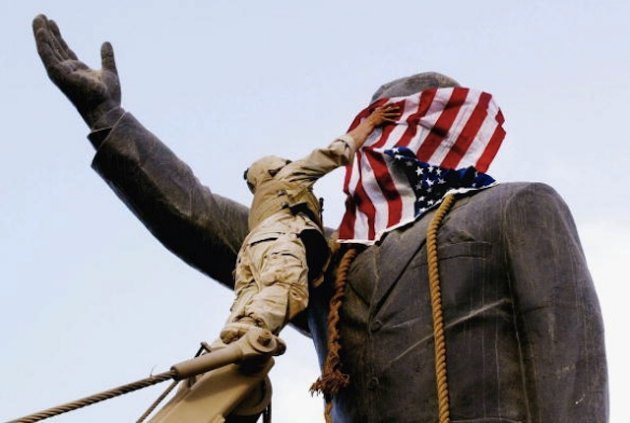In a Fox News interview that aired on Sunday, Feb. 5, President Trump defended Russian President Vladimir Putin when host Bill O’Reilly asked him why he respects him so much if he’s a killer.
“There are a lot of killers,” Trump replied. “Got a lot of killers. What, do you think our country’s so innocent?”
No, our country isn’t innocent. Even though Trump is right, the irony lies in the executive order he signed on January 27. It doesn’t lessen the United States’ faults; it adds to them.
The U.S. has aggressively interfered in all seven of the predominantly-Muslim countries Trump barred in his order.
Basically, we have barred the citizens of the nations we’ve bombed or sabotaged from seeking safe haven within our borders. In other words, “Give us your tired, your poor, your huddled masses; unless we bombed them.”
Here’s a quick look at U.S. interactions with the seven countries.
Iran
One of our earliest incursions involved bringing Shah Mohammed Reza Pahlavi to power in Iran in the 1953 coup against Prime Minister Mohammad Mosaddegh. The shah ruled until his overthrow in the 1979 Iranian Revolution.
In 2013, the CIA revealed that in 1953 it had hired Tehran’s most dreaded gangs to stage pro-Shah uprisings and brought others to the city to take over its streets.
After the revolution, the U.S. supported Iraqi President Saddam Hussein’s war on Iran— even knowing he used chemical weapons against civilians.
Iraq
As for Iraq, four successive presidents have bombed it. Also, the disastrous 1998 U.S.-led sanctions harmed Iraqi civilians instead of accomplishing the goal of forcing the government to follow the U.N. Special Committee’s weapons inspection decree.
According to former President George W. Bush, the 2003 U.S.-led invasion aimed “to disarm Iraq of weapons of mass destruction, to end Saddam Hussein’s support for terrorism and to free the Iraqi people.” Instead, the invasion led to hundreds of thousands of deaths and millions displaced, along with social, economic and political instability that made Iraq the “world capital of terrorism.”
Libya
The U.S. also endangered Libya— a constant military target. In April 1986, our Air Force, Navy and Marine Corps bombed that nation in response to the bombing, by Libyan agents, of a West Berlin discotheque frequented by U.S. servicemen, earlier that month.
The U.S. military also intervened in Libyan matters in 2011, demanding “an immediate ceasefire”, imposing a no-fly zone and approving all resources necessary to protect civilians. Yet, the military detrimentally voided any truce efforts by becoming the de facto air force of the rebels. The U.S. also intervened in the overthrow of former Libyan leader Muammar Qaddafi that same year—destabilizing another country as a result. Last year, former President Obama said his “worst mistake” was “probably failing to plan for the day after what I think was the right thing to do in intervening in Libya”.
Syria
2011 also saw the start of the Syrian civil war. The U.S. has been backing rebel groups in the war since day one. These direct militaristic interventions— as well as others from opposing sides in the conflict— have caused the death of hundreds of thousands, while millions of Syrians have fled their homeland seeking refuge in other countries. Last September, the U.S. military admitted that it accidentally struck Syrian soldiers, killing 62 and injuring hundreds. This did not hinder ISIS, but only led it to advance.
Yemen
The U.S. is also involved in the proxy war and drone war in Yemen. According to a U.N. special report, more than 10,000 civilians are dead, 3 million exiled and millions malnourished because of the U.S.-supported Saudi intervention in Yemen’s civil war.
“The United States provides the bombs,” Chris Murphy, a Democratic Connecticut senator, rightly told NPR in 2016. “We provide the refueling planes in mid-air. We provide the Intel. I think it’s safe to say that this bombing campaign in Yemen could not happen without the United States.”
Sudan
In 1998, the U.S. launched a missile attack on Sudan’s Al-Shifa pharmaceutical factory, which produced more than half of the country’s medicine and employed more than 300 workers. Our government suspected that the factory was dispensing a VX nerve agent and that the owners had bonds with al-Qaeda, but U.S. officials later revealed there was no proof backing these allegations. Today, Sudan is a divided, poor country.
Somalia
Finally, one of the pivots of the drone war, Somalia, has been invaded by U.S.-backed Ethiopian troops in 2006. This invasion shook that country and produced a continuous threat to its civilians’ safety and health.
As the president points out, our country is not innocent; but his executive order only heightens our faults.






Leave a Reply